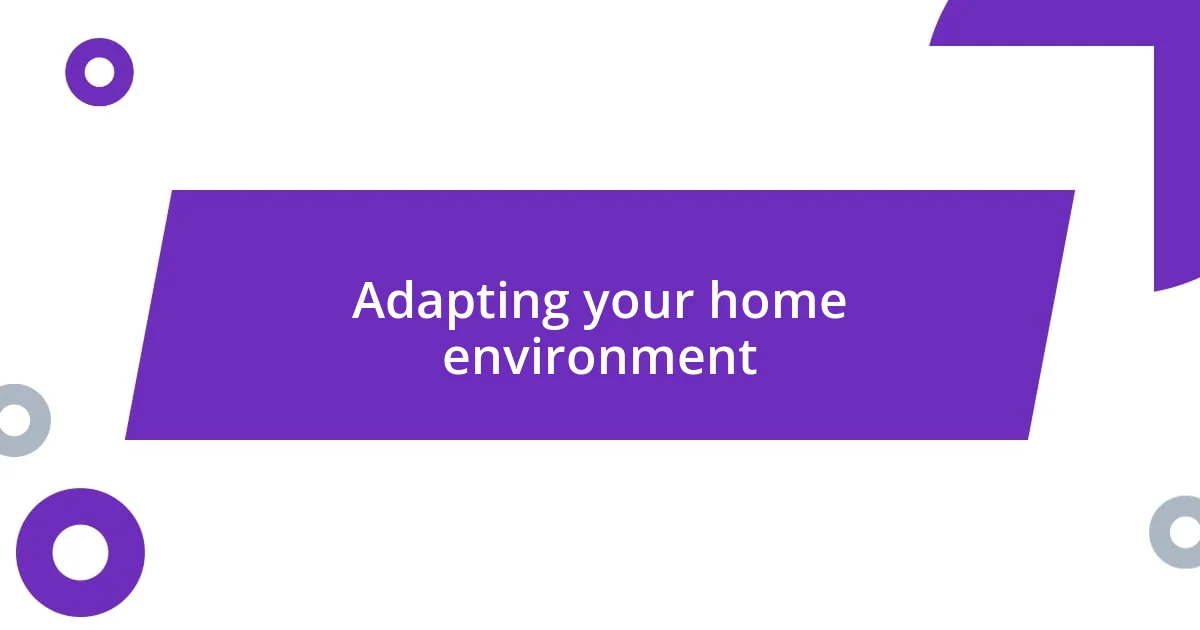Key takeaways:
- Caring for special needs pets requires adapting home environments and understanding their unique communication methods to enhance their well-being.
- Regular health care, medication management, and building a support network with knowledgeable professionals and fellow pet owners are crucial for effective pet care.
- Celebrating milestones and small victories strengthens the bond between pets and owners, making the journey together even more rewarding.

Understanding special needs pets
Understanding special needs pets requires empathy and a willingness to adapt. I remember when I first welcomed a visually impaired dog into my home; it transformed my understanding of what it means to care for a pet. Have you ever wondered how differently you might interact with a creature that relies on senses other than sight?
In my experience, these pets possess a unique resilience that often leaves a profound impact on their owners. For instance, my cat with a limb difference quickly became a master of agility, proving that limitations can sometimes inspire extraordinary creativity. When I observed her navigating obstacles with sheer determination, I couldn’t help but marvel at her spirit.
It’s essential to recognize that special needs pets communicate their needs differently. For a while, I struggled to decode my dog’s subtle cues; however, the bond we formed taught me to listen in a whole new way. How might your perspective change when you start paying attention to the unspoken language of these incredible animals?

Adapting your home environment
Creating a comfortable and safe home environment for a special needs pet is crucial. I vividly recall rearranging my living space when I adopted a sweet little dog who was deaf. Initially, I had to consider how the absence of sound would affect her daily life. It was heartwarming to watch her adapt as I implemented subtle changes, like using visual cues and gentle vibrations to get her attention.
Here’s a few ways to modify your home for a special needs pet:
- Clear pathways: Ensure that furniture is spaced out for easy navigation to prevent accidental bumps.
- Textured mats: Use different textures on the floor for sensory guidance, helping pets with visual impairments.
- Safe resting spots: Create designated areas for comfort and security, such as cozy beds in quiet corners.
- Visual aids: Brightly colored objects or contrasting tapes can serve as guides for pets with limited vision.
These simple adjustments not only improved her confidence but also deepened the bond we shared, making our home feel like a sanctuary tailored just for her.

Health care considerations and tips
When it comes to caring for special needs pets, healthcare considerations are paramount. I learned this firsthand when my senior dog developed arthritis; simple tasks like jumping onto the couch became a challenge. Regular vet check-ups and discussing pain management options made a world of difference for her quality of life. Have you considered how regular assessments can help identify and address the unique health needs of your pet?
Medication and dietary needs can also vary significantly for special needs pets. My cat, who has diabetes, requires a strict meal schedule and regular insulin injections. This routine has fostered a profound sense of responsibility in me, as well as a deeper connection with her. Have you thought about how managing a special diet might strengthen your bond with your pet while improving their health?
It’s invaluable to build a support network of professionals who understand the specific needs of special needs pets. I found that connecting with a vet specializing in geriatric care provided me with insights I never anticipated. Regularly consulting with a dedicated team can guide you through vital decisions. Consider exploring therapy options, like hydrotherapy or acupuncture, which I’ve found beneficial for my pets in managing their conditions.
| Health Care Considerations | Tips for Care |
|---|---|
| Regular vet visits | Keep a log of symptoms or changes in behavior to share with your vet. |
| Medication management | Set alarms on your phone as reminders for medication times. |
| Special diets | Consult a veterinary nutritionist for tailored meal plans. |
| Therapeutic options | Explore alternative therapies to complement traditional care. |

Building a support network
Building a support network has been a game changer in my journey with a special needs pet. When my dog first arrived, I quickly realized I couldn’t do it all alone. Finding local groups and online communities made me feel less isolated. Sharing experiences with other pet owners who understood the unique challenges brought a comforting sense of camaraderie. Have you ever felt overwhelmed by the responsibility of caring for a special needs pet? Connecting with others can really lighten that load.
I remember reaching out to a friend who had experience with therapy animals. Her advice on training methods tailored to my pet’s needs opened up a new world for us. There’s a certain magic in learning from others who’ve faced similar situations. Additionally, I sought professionals, including veterinarians who specialize in behavioral issues. Their insights not only helped with training but also with understanding my pet’s emotional needs during tough times.
The combination of newfound friendships and expert guidance truly enriched our lives. Just the other day, I chatted with a fellow owner who shared simple tricks that had worked wonders for her cat with anxiety. These conversations feel like treasure troves of information, guiding me towards solutions I hadn’t considered. If you haven’t yet formed your own support network, I can’t stress enough how transformative it can be. Why not reach out and see what connections you can make? It might just open doors to a more fulfilling experience for both you and your special needs pet.

Celebrating milestones with your pet
Celebrating milestones with your special needs pet is a unique experience that fills me with joy. I remember the day my senior dog took her first steps unassisted after weeks of physical therapy; it felt like a personal victory. Have you ever witnessed your pet overcoming a challenge? Those moments become precious reminders of their resilience.
I’ve found that marking these milestones—like a birthday or a recovery milestone—strengthens our bond even further. For instance, I once organized a tiny birthday party for my cat, complete with her favorite treats and a cozy gathering of friends. The joy on her face while she sniffed at her special cake was priceless! How do you choose to commemorate your pet’s special moments?
The beauty of celebrating these achievements lies in recognizing the journey we share. Simple acts of celebration can blend well with routine; for instance, after my dog navigated a tough day at the vet, I treated her to an extra-long walk in a new park. It’s these experiences that remind me of how far we’ve come together. What small, meaningful ways do you acknowledge your pet’s growth? Each milestone is not just a step forward, but also a moment to cherish.














